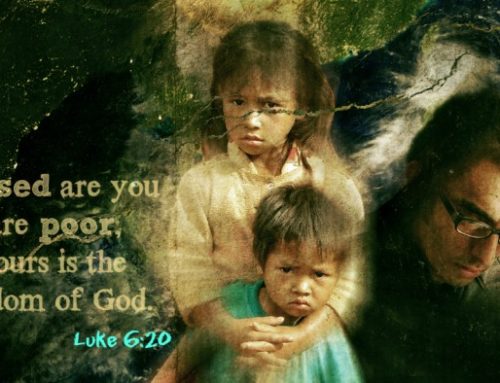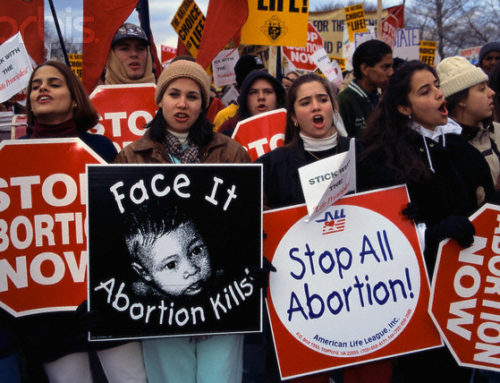Area food banks poised to lose nearly half of commodities
From the article, “”We have billions to spend in Afghanistan or Swiss bank accounts but we can’t feed our own poor. Something is wrong with this society.”” We couldn’t have said it better. There have to be some moral limits on how far budget cuts will go. The bottom has been squeezed until there’s not much left. Thank God for good people and churches like these across the country willing to put themselves out to help.

Original article here. SOUTH BEND – More than 80 agencies of the Food Bank of Northern Indiana are bracing for heavy uts in October after a reduced FY2012 Agricultural Appropriations bill was passed by the House in June.
Washington’s $3 billion cut in funds from FY2011 has trickled over to The Emergency Food Assistance Program used by 16 Elkhart County pantries, which are poised to see nearly 40 percent of their food supplies wiped out.
The bill includes cuts to the Special Supplemental Nutrition Program for Women, Infants and Children, the Commodity Supplemental Food Program and the McGovern-Dole International Food for Education and Child Nutrition Program.
The Food Bank of Northern Indiana had a brainstorming meeting with representatives from its 185 agencies Monday afternoon to discuss how cuts would affect agency operations and to offer possible responses.
Jaime Owen, agency relations manager of the Food Bank of Northern Indiana, moderated the meeting and opened with a telling statistic: More than 2.1 million pounds of food came to the food bank from the United States Department of Agriculture in 2010, which amounted to 38 percent of the organization’s total food for the year.
USDA contributions for the first quarter of 2011 exceed 45 percent of the food bank’s totals.
Several representatives from the 83 agencies facing cuts expressed their frustration and determination to continue feeding clients.
“Hunger is child abuse waiting to happen. Hunger is crime waiting to happen,” said Terri Brandt of Common Ground Food Pantry in Plymouth, her voice wavering with emotion. “There isn’t much I wouldn’t do to take care of my kids.”
Jim Pierchorowski of St. John Evangelical Episcopal Church in Elkhart spoke passionately about how the food assistance allowed his church’s pantry to spend its funds elsewhere, most notably on its Backpacks for Children program.
Pierchorowski said the pantry planned on expanding the program, but the cuts will force it to make a difficult decision.”Are we going to feed old people or feed the children? Who is more valuable to society?” he asked. “We have billions to spend in Afghanistan or Swiss bank accounts but we can’t feed our own poor. Something is wrong with this society.”
Representatives from U.S. Reps. Joe Donnelly and Marlin Stutzman attended to relay comments back to the congressmen. One man from a South Bend pantry gave both representatives a paper bag with two cans of corn.
“Go home and have these for a meal,” the man told them, saying that’s all pantries have to give their clients some days.
By the end of the meeting, Owen and other pantry representatives were offering ideas to prepare for the bill’s impact, such as shortening hours, giving less to clients, nearby pantries combining resources and changing ZIP code regulations to only accept local clients.
Though solutions were tossed around, Brenda Spence of the Bristol Community Food Pantry, which recently ran out of funds, hardly felt subdued.
“We’ve got this cloud over our head,” she said. “We don’t know if it’s going to rain or not. It might be a tornado.”
Kerry Czoch of Faith Mission reflected a similar sentiment. Closing Faith Mission for a few days isn’t an option, she said.
“We cannot choose to close down more days,” she said. “(Our clients) need to eat. If we have our funds cut by 50 percent, we’ll go out into the community and find more. We don’t have a choice.”
The bill, H.R. 2112, passed the House by a vote of 217 to 203 on June 16. It now moves to the Senate, where the representatives from the offices of Donnelly and Stutzman believe the bill will face more moderate cuts. For more information about the bill, visit www.govtrack.us/congress/bill.xpd?bill=h112-2112.
If passed, the 16 Elkhart County agencies affected are Christ’s Commissary, Church Community Services, Church Without Walls Inc., Elkhart SDA Hispanic Church, Faith Mission, Family Services of Elkhart County, Mustard Seed Food Pantry, Northern Indiana Teen Challenge, Open Gate Praise and Deliverance Food Pantry, Salvation Army, St. John Evangelical Episcopal Church and Susannah’s Kitchen, all of Elkhart, First United Food Pantry and The Window, both of Goshen, Family Christian Development Center of Nappanee and First Brethren New Paris.



















Hi there, just became alert to your blog through Google, and found that it’s really informative. I’m gonna watch out for brussels. I will be grateful if you continue this in future. A lot of people will be benefited from your writing. Cheers!
Thank you for the sensible critique. Me and my neighbor were just preparing to do some research on this. We got a grab a book from our area library but I think I learned more from this post. I am very glad to see such magnificent information being shared freely out there.
Very interesting details you have remarked, regards for posting . “Lefty Wise guy dont carry wallets, they carry their money in a roll….beaner on the outs” by Donnie Brasco.
I truly appreciate this post. I’ve been looking all over for this! Thank goodness I found it on Bing. You have made my day! Thx again! “That which does not kill us makes us stronger.” by Friedrich Nietzsche.
Unquestionably consider that which you said. Your favorite reason appeared to be on the net the easiest thing to understand of. I say to you, I certainly get annoyed while other people consider concerns that they plainly do not understand about. You managed to hit the nail upon the highest as well as defined out the entire thing with no need side-effects , other folks can take a signal. Will likely be back to get more. Thanks!
I like this post, enjoyed this one appreciate it for putting up.
I would like to thnkx for the efforts you have put in writing this website. I’m hoping the same high-grade site post from you in the upcoming also. Actually your creative writing skills has inspired me to get my own website now. Really the blogging is spreading its wings rapidly. Your write up is a good example of it.
I like this website its a master peace ! Glad I found this on google. “Americans will put up with anything provided it doesn’t block traffic.” by Dan Rather.
It’s in reality a great and useful piece of information. I’m satisfied that you shared this useful information with us. Please stay us informed like this. Thanks for sharing.
I do trust all the ideas you have introduced to your post. They are very convincing and can definitely work. Still, the posts are very short for starters. Could you please extend them a little from subsequent time? Thank you for the post.
Rattling nice pattern and wonderful content material , absolutely nothing else we need : D.
Very interesting information!Perfect just what I was looking for! “Charity is injurious unless it helps the recipient to become independent of it.” by John Davidson Rockefeller, Sr..
I like this weblog its a master peace ! Glad I found this on google. “Observe your enemies, for they first find out your faults.” by Antisthenes.
Thanks for sharing excellent informations. Your web site is very cool. I’m impressed by the details that you’ve on this site. It reveals how nicely you understand this subject. Bookmarked this website page, will come back for more articles. You, my friend, ROCK! I found just the info I already searched all over the place and simply couldn’t come across. What a great web-site.
Really nice layout and great content material , hardly anything else we need : D.
Thank you so much for this! I havent been this moved by a blog post for a long period of time! You’ve got it, whatever that means in blogging. Well, You are definitely somebody that has something to say that people should hear. Keep up the outstanding work. Keep on inspiring the people!
Really nice design and style and good subject matter, very little else we need : D.
I haven’t checked in here for some time since I thought it was getting boring, but the last few posts are good quality so I guess I’ll add you back to my everyday bloglist. You deserve it my friend 🙂
Thanks for sharing excellent informations. Your site is very cool. I’m impressed by the details that you’ve on this site. It reveals how nicely you perceive this subject. Bookmarked this website page, will come back for more articles. You, my pal, ROCK! I found simply the information I already searched all over the place and just could not come across. What a great web-site.
Thanks for sharing superb informations. Your website is so cool. I am impressed by the details that you’ve on this site. It reveals how nicely you understand this subject. Bookmarked this website page, will come back for extra articles. You, my pal, ROCK! I found just the information I already searched everywhere and simply couldn’t come across. What a great website.
Good site! I truly love how it is simple on my eyes and the data are well written. I’m wondering how I might be notified when a new post has been made. I’ve subscribed to your RSS which must do the trick! Have a nice day! “A crime which is the crime of many none avenge.” by Lucan.
Good blog! I really love how it is easy on my eyes and the data are well written. I’m wondering how I might be notified when a new post has been made. I’ve subscribed to your RSS which must do the trick! Have a nice day! “If you are going to do something wrong at least enjoy it.” by Leo C. Rosten.
Good blog! I really love how it is simple on my eyes and the data are well written. I am wondering how I could be notified when a new post has been made. I have subscribed to your RSS feed which must do the trick! Have a nice day! “Reputation is what other people know about you. Honor is what you know about yourself.” by Lois McMaster Bujold.
Normally I do not read post on blogs, but I wish to say that this write-up very pressured me to take a look at and do it! Your writing style has been surprised me. Thank you, very nice article.
Very interesting topic, regards for posting.
I dugg some of you post as I thought they were extremely helpful extremely helpful
Just wanna input on few general things, The website layout is perfect, the subject matter is real superb : D.
Real excellent information can be found on web blog .
You have noted very interesting details ! ps nice web site . “I didn’t attend the funeral, but I sent a nice letter saying that I approved of it.” by Mark Twain.
You are my intake, I own few blogs and occasionally run out from brand :). “Never mistake motion for action.” by Ernest Hemingway.
Very nice design and style and great written content , hardly anything else we need : D.
I love your writing style really enjoying this web site. “Nature is God’s greatest evangelist.” by Johathan Edwards.
I enjoy the efforts you have put in this, appreciate it for all the great content.
Regards for helping out, wonderful info. “The four stages of man are infancy, childhood, adolescence, and obsolescence.” by Bruce Barton.
I got what you intend, appreciate it for posting .Woh I am pleased to find this website through google. “Remember that what you believe will depend very much on what you are.” by Noah Porter.
I really appreciate this post. I’ve been looking everywhere for this! Thank goodness I found it on Bing. You’ve made my day! Thx again!
I regard something truly interesting about your weblog so I saved to favorites .
Hello, I simply wanted to take time to make a comment and say I have really enjoyed reading your site.
I have been browsing on-line more than three hours these days, yet I by no means found any interesting article like yours. It is beautiful worth enough for me. In my opinion, if all web owners and bloggers made good content material as you probably did, the net will be much more useful than ever before. “When you are content to be simply yourself and don’t compare or compete, everybody will respect you.” by Lao Tzu.
I see something really special in this internet site.
I consider something really special in this web site.
Hey, you used to write excellent, but the last few posts have been kinda boring… I miss your great writings. Past several posts are just a bit out of track! come on!”Partake of some of life’s sweet pleasures. And yes, get comfortable with yourself.” by Oprah Winfrey.
Its like you learn my mind! You appear to grasp so much about this, such as you wrote the e book in it or something. I feel that you just can do with some percent to drive the message home a little bit, however instead of that, that is fantastic blog. A fantastic read. I will definitely be back.
great content. I came upon your online site and wished to inform you that I’ve certainly enjoyed browsing your data sites. At any rate I will be following your feed so i hope you’re posting again soon.
Utterly composed subject material, appreciate it for information. “In the fight between you and the world, back the world.” by Frank Zappa.
Outstanding post, I believe blog owners should larn a lot from this weblog its real user friendly. So much fantastic information on here :D.
I have not checked in here for some time because I thought it was getting boring, but the last several posts are good quality so I guess I’ll add you back to my daily bloglist. You deserve it my friend 🙂
I was studying some of your articles on this internet site and I think this website is rattling informative! Keep on posting.
I am impressed, I have to say. Very rarely do I encounter a blog that’s both informative and entertaining, and let me tell you, you’ve hit the nail on the head. Your blog is outstanding; the issue is something that not a lot of people are talking intelligently about. I am really happy that I stumbled across this in my search for something relating to this.
I’ve recently started a web site, the information you offer on this website has helped me greatly. Thanks for all of your time & work.
I always was concerned in this topic and stock still am, thank you for putting up.
I was reading some of your posts on this website and I think this web site is really informative ! Keep on putting up.
Hey very cool web site!! Man .. Beautiful .. Amazing .. I’ll bookmark your web site and take the feeds also…I’m happy to find so many useful info here in the post, we need work out more techniques in this regard, thanks for sharing. . . . . .
What i do not understood is in fact how you’re not actually much more neatly-favored than you may be right now. You are so intelligent. You recognize therefore significantly relating to this topic, produced me for my part consider it from numerous various angles. Its like men and women are not interested unless it’s something to accomplish with Lady gaga! Your individual stuffs nice. Always deal with it up!
I like this web site very much, Its a very nice position to read and receive info. “Hope and fear are inseparable. There is no hope without fear, nor any fear without hope.” by La Rochefoucauld.
I keep listening to the rumor speak about getting free online grant applications so I have been looking around for the best site to get one. Could you advise me please, where could i acquire some?
You should check this out…
[…] Wonderful story, reckoned we could combine a few unrelated data, nevertheless really worth taking a look, whoa did one learn about Mid East has got more problerms as well […]……
Read was interesting, stay in touch……
[…]please visit the sites we follow, including this one, as it represents our picks from the web[…]……
Websites we think you should visit…
[…]although websites we backlink to below are considerably not related to ours, we feel they are actually worth a go through, so have a look[…]…
Digg this…
While checking out DIGG today I noticed this…
Car Warranty News and Reviews…
[…]while the sites we link to below are`nt related to ours, but are cool[…]…
Digg this…
While checking out DIGG yesterday I found this…
SEO Marketing and Web Developement…
[…]the time to read or check out the content or places we have linked to underneath the[…]…
Websites worth visiting…
[…]here are some links to sites that we link to because we think they are worth visiting[…]……
Looking around…
While I was browsing today I saw a great article about…
This Week in Automobile News…
[…]here are some links to websites worth checking out[…]…
computer recycling…
[…]check out the content or pages we have […]…
Sources…
[…]check below, are some totally unrelated websites to ours, however, they are most trustworthy sources that we use[…]……
Recommeneded websites…
[…]Here are some of the sites we recommend for our visitors[…]……
Superb website…
[…]always a big fan of linking to bloggers that I love but don’t get a lot of link love from[…]……
Recommeneded websites…
[…]Here are some of the sites we recommend for our visitors[…]……
Sources…
[…]check below, are some totally unrelated websites to ours, however, they are most trustworthy sources that we use[…]……
Great website…
[…]we like to honor many other internet sites on the web, even if they aren’t linked to us, by linking to them. Under are some webpages worth checking out[…]……
Great website…
[…]we like to honor many other internet sites on the web, even if they aren’t linked to us, by linking to them. Under are some webpages worth checking out[…]……
Recommeneded websites…
[…]Here are some of the sites we recommend for our visitors[…]……
Awesome website…
[…]the time to read or visit the content or sites we have linked to below the[…]……
Online Article……
[…]The information mentioned in the article are some of the best available […]……
Visitor recommendations…
[…]one of our visitors recently recommended the following website[…]……
Blogs ou should be reading…
[…]Here is a Great Blog You Might Find Interesting that we Encourage You[…]……
Blogs ou should be reading…
[…]Here is a Great Blog You Might Find Interesting that we Encourage You[…]……
Gems form the internet…
[…]very few websites that happen to be detailed below, from our point of view are undoubtedly well worth checking out[…]……
Online Article……
[…]The information mentioned in the article are some of the best available […]……
Sources…
[…]check below, are some totally unrelated websites to ours, however, they are most trustworthy sources that we use[…]……
Websites we think you should visit…
[…]although websites we backlink to below are considerably not related to ours, we feel they are actually worth a go through, so have a look[…]……
Blogs ou should be reading…
[…]Here is a Great Blog You Might Find Interesting that we Encourage You[…]……
Online Article……
[…]The information mentioned in the article are some of the best available […]……
Websites worth visiting…
[…]here are some links to sites that we link to because we think they are worth visiting[…]……
Great website…
[…]we like to honor many other internet sites on the web, even if they aren’t linked to us, by linking to them. Under are some webpages worth checking out[…]……
Sources…
[…]check below, are some totally unrelated websites to ours, however, they are most trustworthy sources that we use[…]……
Links…
[…]Sites of interest we have a link to[…]……
Recent Blogroll Additions……
[…]usually posts some very interesting stuff like this. If you’re new to this site[…]……
Check this out…
[…] that is the end of this article. Here you’ll find some sites that we think you’ll appreciate, just click the links over[…]……
Visitor recommendations…
[…]one of our visitors recently recommended the following website[…]……
Sources…
[…]check below, are some totally unrelated websites to ours, however, they are most trustworthy sources that we use[…]……
Related……
[…]just beneath, are numerous totally not related sites to ours, however, they are surely worth going over[…]……
Check this out…
[…] that is the end of this article. Here you’ll find some sites that we think you’ll appreciate, just click the links over[…]……
Websites you should visit…
[…]below you’ll find the link to some sites that we think you should visit[…]……
Automotive News and Reviews…
[…]just below, are some cool websites[…]…
You should check this out…
[…] Wonderful story, reckoned we could combine a few unrelated data, nevertheless really worth taking a look, whoa did one learn about Mid East has got more problerms as well […]……
it asset disposition…
[…]we like to link to other web sites on the web, even if they aren’t related to us[…]…
Read was interesting, stay in touch……
[…]please visit the sites we follow, including this one, as it represents our picks from the web[…]……
Awesome website…
[…]the time to read or visit the content or sites we have linked to below the[…]……
Superb website…
[…]always a big fan of linking to bloggers that I love but don’t get a lot of link love from[…]……
Superb website…
[…]always a big fan of linking to bloggers that I love but don’t get a lot of link love from[…]……
Great website…
[…]we like to honor many other internet sites on the web, even if they aren’t linked to us, by linking to them. Under are some webpages worth checking out[…]……
This Week in Automobile News…
[…]here are some links to pages worth going to[…]…
Read was interesting, stay in touch……
[…]please visit the sites we follow, including this one, as it represents our picks from the web[…]……
Websites worth visiting…
[…]here are some links to sites that we link to because we think they are worth visiting[…]……
Blogs ou should be reading…
[…]Here is a Great Blog You Might Find Interesting that we Encourage You[…]……
Online Article……
[…]The information mentioned in the article are some of the best available […]……
Recent Blogroll Additions……
[…]usually posts some very interesting stuff like this. If you’re new to this site[…]……
Recommeneded websites…
[…]Here are some of the sites we recommend for our visitors[…]……
Read was interesting, stay in touch……
[…]please visit the sites we follow, including this one, as it represents our picks from the web[…]……
Check this out…
[…] that is the end of this article. Here you’ll find some sites that we think you’ll appreciate, just click the links over[…]……
Recommeneded websites…
[…]Here are some of the sites we recommend for our visitors[…]……
Visitor recommendations…
[…]one of our visitors recently recommended the following website[…]……
Recommeneded websites…
[…]Here are some of the sites we recommend for our visitors[…]……
Visitor recommendations…
[…]one of our visitors recently recommended the following website[…]……
Gems form the internet…
[…]very few websites that happen to be detailed below, from our point of view are undoubtedly well worth checking out[…]……
FoxTec has the best parts online…
[…]just below, are some totally unrelated web sites to ours, however, they are definitely worth checking out[…]…
Websites we think you should visit…
[…]although websites we backlink to below are considerably not related to ours, we feel they are actually worth a go through, so have a look[…]……
Websites you should visit…
[…]below you’ll find the link to some sites that we think you should visit[…]……
Superb website…
[…]always a big fan of linking to bloggers that I love but don’t get a lot of link love from[…]……
You should check this out…
[…] Wonderful story, reckoned we could combine a few unrelated data, nevertheless really worth taking a look, whoa did one learn about Mid East has got more problerms as well […]……
Visitor recommendations…
[…]one of our visitors recently recommended the following website[…]……
Websites we think you should visit…
[…]although websites we backlink to below are considerably not related to ours, we feel they are actually worth a go through, so have a look[…]……
Links…
[…]Sites of interest we have a link to[…]……
Related……
[…]just beneath, are numerous totally not related sites to ours, however, they are surely worth going over[…]……
Recommeneded websites…
[…]Here are some of the sites we recommend for our visitors[…]……
Recent Blogroll Additions……
[…]usually posts some very interesting stuff like this. If you’re new to this site[…]……
Online Article……
[…]The information mentioned in the article are some of the best available […]……
Cool sites…
[…]we came across a cool site that you might enjoy. Take a look if you want[…]……
You should check this out…
[…] Wonderful story, reckoned we could combine a few unrelated data, nevertheless really worth taking a look, whoa did one learn about Mid East has got more problerms as well […]……
Sources…
[…]check below, are some totally unrelated websites to ours, however, they are most trustworthy sources that we use[…]……
Awesome website…
[…]the time to read or visit the content or sites we have linked to below the[…]……
Websites worth visiting…
[…]here are some links to sites that we link to because we think they are worth visiting[…]……
Related……
[…]just beneath, are numerous totally not related sites to ours, however, they are surely worth going over[…]……
Blogs ou should be reading…
[…]Here is a Great Blog You Might Find Interesting that we Encourage You[…]……
Great website…
[…]we like to honor many other internet sites on the web, even if they aren’t linked to us, by linking to them. Under are some webpages worth checking out[…]……
Check this out…
[…] that is the end of this article. Here you’ll find some sites that we think you’ll appreciate, just click the links over[…]……
Read was interesting, stay in touch……
[…]please visit the sites we follow, including this one, as it represents our picks from the web[…]……
Superb website…
[…]always a big fan of linking to bloggers that I love but don’t get a lot of link love from[…]……
Recent Blogroll Additions……
[…]usually posts some very interesting stuff like this. If you’re new to this site[…]……
Websites we think you should visit…
[…]although websites we backlink to below are considerably not related to ours, we feel they are actually worth a go through, so have a look[…]……
Websites worth visiting…
[…]here are some links to sites that we link to because we think they are worth visiting[…]……
Superb website…
[…]always a big fan of linking to bloggers that I love but don’t get a lot of link love from[…]……
Cool sites…
[…]we came across a cool site that you might enjoy. Take a look if you want[…]……
Gems form the internet…
[…]very few websites that happen to be detailed below, from our point of view are undoubtedly well worth checking out[…]……
Great website…
[…]we like to honor many other internet sites on the web, even if they aren’t linked to us, by linking to them. Under are some webpages worth checking out[…]……
Sites we Like……
[…] Every once in a while we choose blogs that we read. Listed below are the latest sites that we choose […]……
Websites worth visiting…
[…]here are some links to sites that we link to because we think they are worth visiting[…]……
Visitor recommendations…
[…]one of our visitors recently recommended the following website[…]……
Related……
[…]just beneath, are numerous totally not related sites to ours, however, they are surely worth going over[…]……
Online Article……
[…]The information mentioned in the article are some of the best available […]……
Cool sites…
[…]we came across a cool site that you might enjoy. Take a look if you want[…]……
Related……
[…]just beneath, are numerous totally not related sites to ours, however, they are surely worth going over[…]……
You should check this out…
[…] Wonderful story, reckoned we could combine a few unrelated data, nevertheless really worth taking a look, whoa did one learn about Mid East has got more problerms as well […]……
Online Article……
[…]The information mentioned in the article are some of the best available […]……
Recent Blogroll Additions……
[…]usually posts some very interesting stuff like this. If you’re new to this site[…]……
Wikia…
Wika linked to this site…
Recommended websites…
[…]Here are some of the sites we recommend for our visitors[…]……
Recent Blogroll Additions……
[…]usually posts some very interesting stuff like this. If you’re new to this site[…]……
Websites we think you should visit…
[…]although websites we backlink to below are considerably not related to ours, we feel they are actually worth a go through, so have a look[…]……
Cool sites…
[…]we came across a cool site that you might enjoy. Take a look if you want[…]……
Bored at work…
I like to browse around the web, often I will just go to Digg and follow thru…
Related……
[…]just beneath, are numerous totally not related sites to ours, however, they are surely worth going over[…]……
Visitor recommendations…
[…]one of our visitors recently recommended the following website[…]……
Visitor recommendations…
[…]one of our visitors recently recommended the following website[…]……
Related……
[…]just beneath, are numerous totally not related sites to ours, however, they are surely worth going over[…]……
Recommeneded websites…
[…]Here are some of the sites we recommend for our visitors[…]……
Online Article……
[…]The information mentioned in the article are some of the best available […]……
Awesome website…
[…]the time to read or visit the content or sites we have linked to below the[…]……
Websites worth visiting…
[…]here are some links to sites that we link to because we think they are worth visiting[…]……
Blogs ou should be reading…
[…]Here is a Great Blog You Might Find Interesting that we Encourage You[…]……
Websites you should visit…
[…]below you’ll find the link to some sites that we think you should visit[…]……
Sources…
[…]check below, are some totally unrelated websites to ours, however, they are most trustworthy sources that we use[…]……
Recommeneded websites…
[…]Here are some of the sites we recommend for our visitors[…]……
Yahoo results…
While browsing Yahoo I found this page in the results and I didn’t think it fit…
You should check this out…
[…] Wonderful story, reckoned we could combine a few unrelated data, nevertheless really worth taking a look, whoa did one learn about Mid East has got more problerms as well […]……
You should check this out…
[…] Wonderful story, reckoned we could combine a few unrelated data, nevertheless really worth taking a look, whoa did one learn about Mid East has got more problerms as well […]……
PotSpot 411…
[…]Cool web sites we check out[…]…
Medical Marijuana…
[…]Under here you’ll find the links to some Hip places[…]…
You should check this out…
[…] Wonderful story, reckoned we could combine a few unrelated data, nevertheless really worth taking a look, whoa did one learn about Mid East has got more problerms as well […]……
Read was interesting, stay in touch……
[…]please visit the sites we follow, including this one, as it represents our picks from the web[…]……
Related……
[…]just beneath, are numerous totally not related sites to ours, however, they are surely worth going over[…]……
Online Article……
[…]The information mentioned in the article are some of the best available […]……
Check this out…
[…] that is the end of this article. Here you’ll find some sites that we think you’ll appreciate, just click the links over[…]……
Online Article……
[…]The information mentioned in the article are some of the best available […]……
Great website…
[…]we like to honor many other internet sites on the web, even if they aren’t linked to us, by linking to them. Under are some webpages worth checking out[…]……
Sites we Like……
[…] Every once in a while we choose blogs that we read. Listed below are the latest sites that we choose […]……
Websites you should visit…
[…]below you’ll find the link to some sites that we think you should visit[…]……
Recent Blogroll Additions……
[…]usually posts some very interesting stuff like this. If you’re new to this site[…]……
Online Article……
[…]The information mentioned in the article are some of the best available […]……
Cool sites…
[…]we came across a cool site that you might enjoy. Take a look if you want[…]……
Gems form the internet…
[…]very few websites that happen to be detailed below, from our point of view are undoubtedly well worth checking out[…]……
You should check this out…
[…] Wonderful story, reckoned we could combine a few unrelated data, nevertheless really worth taking a look, whoa did one learn about Mid East has got more problerms as well […]……